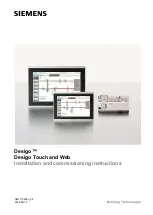
PPC65B-1x/Best Practices
v1.0
www.winsystems.com
Page 58
Appendix A. Best Practices
This section outlines the best practices for operating the PPC65B-1x in a safe and
effective manner that does not damage the board. Please read this section carefully.
Power Supply
Power Supply Budget
Evaluate your power supply budget. It is usually good practice to budget twice the
typical power requirement for all of your devices.
Power Harness
Minimize the length of the power harness. This will reduce the amount of voltage drop
between the power supply and the PPC65B-1x.
Gauge Wire
Use the largest gauge wire available for your application and connector. Most connector
manufacturers have a maximum gauge wire they recommend for their pins.
Power Down
Make sure that power has been removed from the system before making or breaking
any connections.
I/O Connections OFF
—I/O Connections should also be off before connecting them to
the embedded computer modules or any I/O cards. Connecting hot signals can cause
damage whether the embedded system is powered or not.
Avoid Electrostatic Discharge (ESD)
—Only handle the circuit board and other bare
electronics when electrostatic discharge (ESD) protection is in place. Having a wrist
strap and a fully grounded workstation is the minimum ESD protection required
before the ESD seal on the product bag is broken.
Use Proper Power Connections (Voltage)
—When verifying the voltage, measure it
at the power connector on the PPC65B-1x. Measuring it at the power supply does not
account for voltage drop through the wire and connectors.
Power Supply OFF
—The power supply should always be off before it is connected to
the I/O Module. Do not hot-plug the PPC65B-1x on a host platform that is already
powered.








































